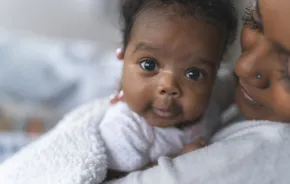
If you walk around Seattle’s Green Lake, you may see two trees with purple heart-shaped leaves and pink flowers that bloom around Mother’s Day. Seattle’s Kate and Caleb Banta-Green* and their son, Bobby, planted these trees in honor of their daughter, Lucy, who died at 38 weeks of pregnancy, before she had a chance to take her first breath.
When the shock and pain of losing their baby in an otherwise healthy pregnancy subsided sufficiently to allow them to make room for another child, they conceived their third child, Pete, who was born healthy and strong.
Despite the fact that professionals could find no medical reason for the stillbirth, the Banta-Green family’s perspective on the third pregnancy was heavily influenced by Lucy’s death. “Pete’s pregnancy was completely different emotionally than the others,” says Kate. “I was coming from a place of fear, not a place of hope, and that is really stressful. Previously, I had faith that everything was going to be OK; then I had no faith at all — not in my body, the world, the universe — nothing.”
A common loss
Kate’s perspective of fear and anxiety about her pregnancy after such a loss is not uncommon. Sadly, neither is pregnancy loss. According to the March of Dimes, about 15 percent of recognized pregnancies end in miscarriage, which is a pregnancy loss that occurs before 20 weeks. That number may be as high as 50 percent because many losses occur before a woman realizes she is pregnant. After 20 weeks gestation, the death of a fetus is called stillbirth. Approximately 500 stillbirths occur annually in Washington, and 60 percent of those are totally unexplained, according to A Small Victory, an organization dedicated to supporting parents who experience perinatal loss. About 85 percent of stillbirths occur before labor begins.
Despite the frequency of losses like these, many people never discuss them, and so when a woman loses a baby, she doesn’t know how common her — and her partner’s — experience is. Caleb recalls: “We sent out a birth notice about Lucy to friends and family and received the most heartfelt, wonderful and personal cards and letters. Some of the notes mentioned people’s own tragic and unknown birth stories, some stretching back 40 years.”
Ellie Hochman, M.S.W., a clinical social worker in Kirkland, specializes in dealing with unexpected outcomes relating to perinatal and postpartum issues. “There is a cone of silence around these types of losses,” Hochman says. “It’s one of those things that people still have trouble discussing.” Still, Hochman advises that parents who have lost a child — at any stage of pregnancy or after birth — need to find ways to grieve. “It’s key to process the grief and trauma so you can move on and create a space to allow the next pregnancy to be a whole experience in and of itself.”
The processing of that trauma and grief can take many shapes. “Rituals help,” says Hochman. Ritual can include naming the baby, holding a service, sending out a birth announcement, planting a tree, or anything else that helps the parents honor the loss they experienced. Gigi Wickwire from Bothell has become an expert in rituals to process grief. After a first-trimester miscarriage, Gigi and her husband held a private ceremony and placed their child’s remains in an abandoned robin’s nest and buried under a tree. After a subsequent complicated pregnancy, their son, Cassius, lived less than a day outside of the protection of Gigi’s womb. After his death, Gigi and her family held Cassius, spoke with him, photographed him, prayed and blessed him and held a memorial service in his honor. After a third pregnancy, which ended in loss in the second trimester, they grieved the loss of their third child, Nala, in more private ways. Now, they see trees planted in honor of their sons each day on the farm they moved to after they lost Nala. Yet, one needn’t embark upon a complicated and public ritual to process grief. “Just sharing your story with someone who can really listen can be an incredibly important ritual,” says Gigi.
Though she and her husband can’t say for sure what the future holds, Gigi says she has learned a great deal from the losses of her babies, including how to go forward with another pregnancy after a heartbreaking loss. “You need to feel like you honored yourself and your baby before you can move forward,” she says. “A lot of cultures encourage women to take a year to conceive again. It takes time to process the last experience, and it is imperative for parents not to have regrets.”
Regrets are what Liz Allen of Covington is trying to help parents avoid. Liz and her husband, Ethan, started the nonprofit A Small Victory in honor of their daughter, who was stillborn at 31 weeks. A Small Victory provides loss kits, which include memory boxes, baby blankets, burial gowns, foot print cards, disposable cameras and books about loss and grieving. They also provide education to medical staff and peer-to-peer counseling for mothers who experience perinatal loss.
“I had feelings of regret and anger after my daughter’s birth,” explains Liz. “I wished I had more pictures. We have only one. My husband and I realized that many people must experience this. You only get 24 hours with your baby. The nurses are your only coaches and if they don’t know how to guide you through the grief, you are on your own.” A Small Victory seeks to help guide parents through those early hours of grief so that they will not spend the rest of their lives regretting missed opportunities to memorialize their children.
No matter how well a loss is processed, a subsequent pregnancy will include anxiety, according to Hochman. “Suddenly, we are not protected by our own denial.” A woman who has experienced this type of loss is faced with the fear of repetition. Sometimes anxiety peaks around certain points. “When you come to the anniversary of events from a pregnancy in which a loss occurred, there are a lot of intense feelings,” says Hochman. “The loss is not ritualized in our culture, so people often feel terrible about talking about their anxiety.”
Kate recalls that her second pregnancy was haunted by the memories of the first.
“Throughout my entire subsequent pregnancy, I had wanted to get the baby out before 38 weeks because I didn’t want whatever happened to Lucy to happen to this baby,” she says. Ultimately, Kate chose induction at 39 weeks because she could no longer stand the anxiety of waiting for her baby to be born.
This is a common request by women, according to Robin De Regt, M.D., from Eastside Maternal Fetal Medicine in Kirkland. “Patients can be so nervous about a late third-trimester loss that they start wanting to be delivered prematurely. You have to ask when to draw the line. We don’t want to force labor early and increase Caesarean rates or risk complications of prematurity,” she says. In such situations, Dr. De Regt works through the risks and benefits with her client, considering tests that can be done to assess readiness for birth, and ultimately making a decision with her client that balances the factors.
“You are going to relive the previous pregnancy at each stage of the next,” explains Dr. De Regt. “Sometimes when it’s the same, it’s scary. Sometimes when it’s different, it’s scary. A pregnant woman may need more attention, including more visits, during the anniversary of a loss to provide reassurance. Sometimes she just needs to come in and have a nurse listen to the heartbeat, even without an appointment.” Dr. De Regt recommends that pregnant women in these circumstances go ahead and ask their care providers for this kind of attention.
These apprehensions are not limited to women whose loss is late in pregnancy. Nikki Wilson, from Seattle, says of her pregnancy subsequent to an early first-trimester miscarriage: “I was concerned for at least the first four months that there was something wrong with the baby. We did an ultrasound at 18 weeks that was reassuring, and I stopped worrying so much.” Still, Wilson checked for spotting every day during that pregnancy, even well into the third trimester. “About a month before my due date, it occurred to me that spotting at that point would be a sign of labor rather than a sign of miscarriage! It really took me that long to stop worrying about losing the baby.”
Kim James, a Seattle doula and childbirth educator, found her solution to coping with the anxiety of a pregnancy after a late first-trimester miscarriage. “I rented a hand-held Doppler to listen to the baby’s heart beat anytime I wanted to,” she says. Of course, this solution is not for everyone; no doubt Kim’s professional experience improved her accuracy with locating the heartbeat.
It may help to realize that not everyone can find peace with a pregnancy after loss. “It’s helpful for women to know that their subsequent pregnancy is going to suck,” advises Liz. “I know it sounds weird, but if you know going into it that you are going to be on a roller coaster of emotions and be scared to death 90 percent of the time, it will be easier for you.”
* Some of the names in this story have been changed.
Tera Schreiber is tentatively enjoying her fourth pregnancy, after a pregnancy loss last fall. She lives in Seattle with her husband and two daughters.
Resources
Empty Arms: Coping with Miscarriage, Stillbirth and Infant Death by Sherokee llse
Tear Soup by Pat Schweibert, Chuck DeKlyen and Taylor Bills
A Small Victory
BabyCenter grief and loss bulletin boards
Originally published in the September, 2007 print edition of ParentMap.











